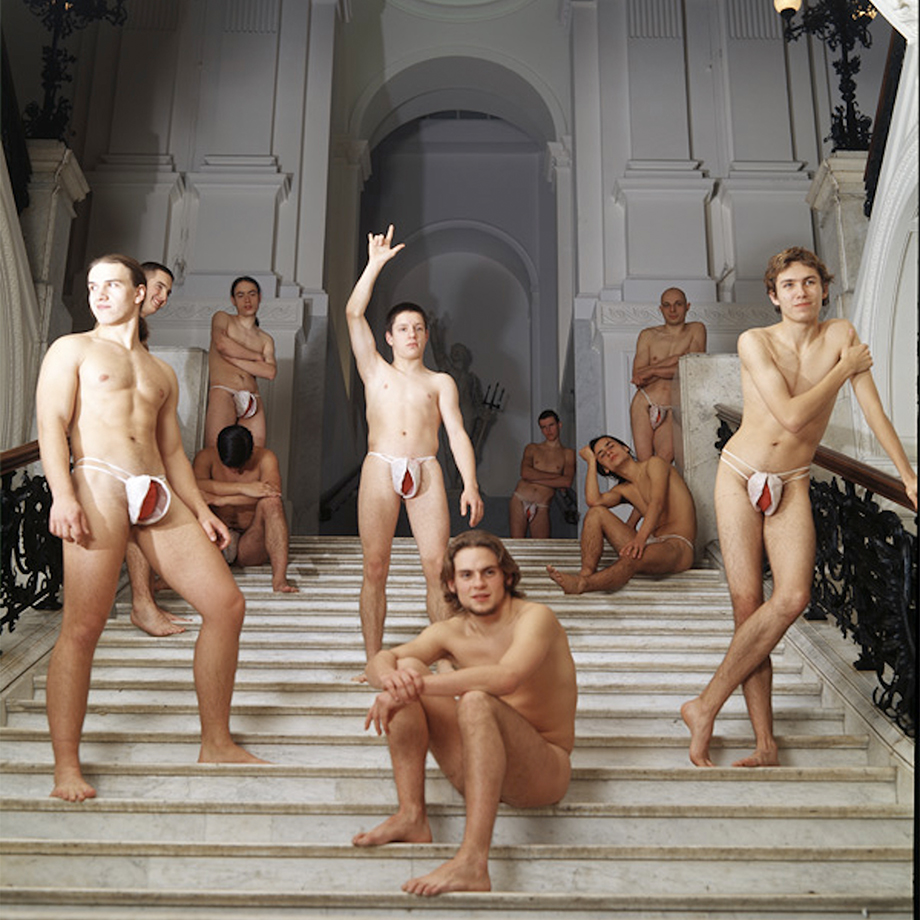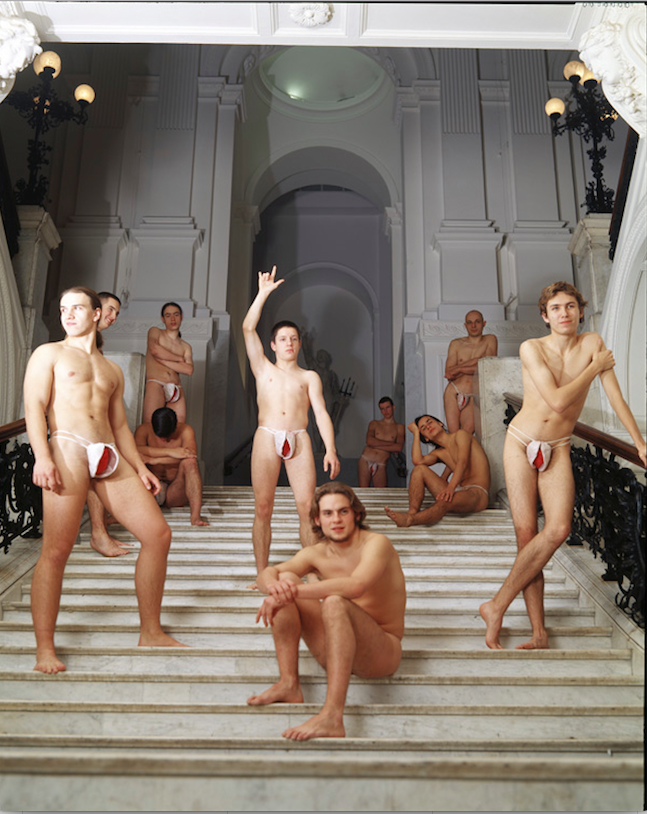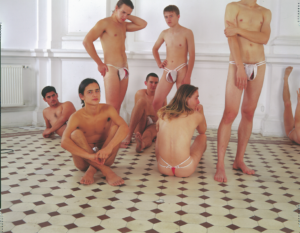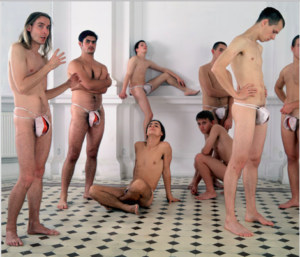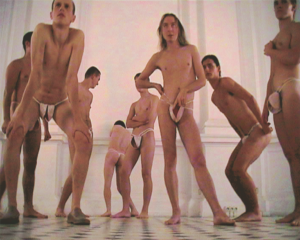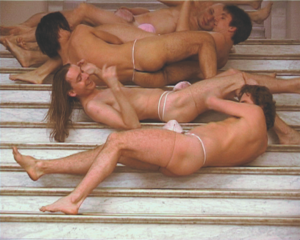BOYS
Video projection and photography series
2001
________________________________________________________________________________________________________________________________________________________________________________
TECHNICAL DETAILS
Video projection (colour), loop 4:3 PAL, duration: 14’17”, audio:
“Spears”, 5’28
“Ragazzi”, 4’00”
“Stairs”, 4’04
Large format colour photographs, various sizes of prints.
________________________________________________________________________________________________________________________________________________________________________________
- Boys, photo from the series
- Boys, photo from the series
- Boys, photo from the series
________________________________________________________________________________________________________________________________________________________________________________
DEMO
________________________________________________________________________________________________________________________________________________________________________________
DESCRIPTION
The piece consists of three short videos which can be screened separately (“Spears,” “Ragazzi,” “Stairs”) or as a looped projection. Apart from the films, an independent series of photographs was taken.
The concept of the series relies on the video and photographic record of improvised actions of a group of young men placed in various situations. They interact, recalling poses and figures familiar from the popular culture. In the interview for the New York Times (Michael Rush, “A Renegade’s Art of the Altogether”, “New York Times”, 21.04.2002) Katarzyna Kozyra commented on their actions thus: “They shamelessly flexed in front of the cameras. […] They behaved like roosters, proudly parading in front of one another, demonstrating their sexual readiness.” This “sexual readiness” of the series’ protagonists would be mocked by attributing them with literal male attributes (“spears”), or – above all – by dressing them in pink underpants resembling in their form female genitalia.
By inverting methods of clandestine observation which the audience may know from her previous works („Bathhouse,” „Men’s Bathhouse“) Kozyra eventually puts a group of young man on display in front of the camera, using her own talents, and turns tables on these ancient conspirators, peeping toms and narcissists. “They are us,” she emphasises.
Patrycja Ostaszewska
________________________________________________________________________________________________________________________________________________________________________________
- Boys (Ragazzi), video still
- Boys (Spears), video still
- Boys (Stairs), video still
________________________________________________________________________________________________________________________________________________________________________________
Men are from Mars – Katarzyna Kozyra at Postmasters, New York
April 27 – June 1, 2002
Who, gentle Thing reader, is the best-known among the new generation of Polish artists” Hmmm…” Do you need a lifeline? Not if you attended Katarzyna Kozyra’s debut solo exhibition in New York, at Chelsea’s Postmasters. With two new projects created for the exhibition, Boys and Punishment and Crime (both 2002), Kozyra continued to explore gender, documentary and dramatic video and mediated violence. Previously, in two surreptitiously recorded video installations, Men’s Bathhouse (a prizewinner at the 1999 Venice Biennale) and Women’s Bathhouse, Kozyra observed women among women and men among men (in the latter case disguised as a man), secretly recording bathhouse patrons. She was fascinated by the different behaviours of the two sexes, for example, women’s lack of self-consciousness and, by contrast, men’s intense awareness of one another’s bodies. In 1993’s notorious Pyramid of Animals, she stacked a custom-killed-and-stuffed horse, dog, cat, and cock in a wry commentary on the food chain. The piece not only assured her infamy in her home country but also, having taken part in the animals’ slaughter, left her emotionally scarred.
To quote the artist, actually describing Men’s Bathhouse, at Postmasters she continued to study men “without their ‘protective layer,’ … without all their status symbols.” Boys, in the gallery’s front room, featured photographs and videos of a group of attractive young men, nude but for comical “inverted tulip” loincloths that imitate female genitalia. Placed before the camera without instructions, as the artist described it in the New York Times, “They acted like roosters, strutting in front of one another, flaunting their erotic readiness.” In a video shot on a staircase in Warsaw’s neoclassical Zacheta National Gallery, the men stand below a marble statue of a triton-wielding Neptune and (ahem) gently play-fight with long rods. Art- and film-historical imagery is spontaneously re-created; gender behaviours are playfully traded…
Brian Boucher
________________________________________________________________________________________________________________________________________________________________________________
ADDITIONAL INFORMATION
-
Music which can be heard in the background is performed on harp by Wiktor Gutt.
-
Photographs were taken in Zachęta – National Gallery of Art in Warsaw.
-
The “Boys” series results from the realisation of “Dance Lesson”.
-
With pieces “Boys” and “Punishment and Crime” in 2002 Katarzyna Kozyra debuted in New York commercial galleries.
________________________________________________________________________________________________________________________________________________________________________________
SEE MORE
- “Katarzyna Kozyra, Casting”, Zachęta – National Gallery of Art, Warsaw 2010.
- “Katarzyna Kozyra”, Galleria Civica di Arte Contemporanea, Trento 2004.
________________________________________________________________________________________________________________________________________________________________________________
The Artist would like to thank all her collaborators and people who helped in the realisation of the project, in particular:
Wiktor Gut, Julia Leopold, Ewa Łuczak
Production:
Zachęta – National Gallery of Art, Warsaw.
The piece was created with the support of Kozyra’s mother, Alicja.
